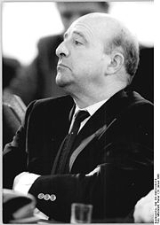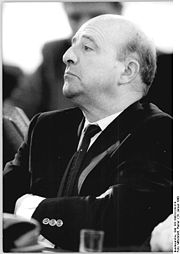
Wolfgang Ullmann
Encyclopedia

Germany
Germany , officially the Federal Republic of Germany , is a federal parliamentary republic in Europe. The country consists of 16 states while the capital and largest city is Berlin. Germany covers an area of 357,021 km2 and has a largely temperate seasonal climate...
journalist
Journalist
A journalist collects and distributes news and other information. A journalist's work is referred to as journalism.A reporter is a type of journalist who researchs, writes, and reports on information to be presented in mass media, including print media , electronic media , and digital media A...
, theologian, politician
Politician
A politician, political leader, or political figure is an individual who is involved in influencing public policy and decision making...
.
Life
Wolfgang Ullmann was born in Bad Gottleuba near DresdenDresden
Dresden is the capital city of the Free State of Saxony in Germany. It is situated in a valley on the River Elbe, near the Czech border. The Dresden conurbation is part of the Saxon Triangle metropolitan area....
. From 1948 to 1954 he studied Protestant
Protestantism
Protestantism is one of the three major groupings within Christianity. It is a movement that began in Germany in the early 16th century as a reaction against medieval Roman Catholic doctrines and practices, especially in regards to salvation, justification, and ecclesiology.The doctrines of the...
theology and also philosophy
Philosophy
Philosophy is the study of general and fundamental problems, such as those connected with existence, knowledge, values, reason, mind, and language. Philosophy is distinguished from other ways of addressing such problems by its critical, generally systematic approach and its reliance on rational...
, first in Berlin
Berlin
Berlin is the capital city of Germany and is one of the 16 states of Germany. With a population of 3.45 million people, Berlin is Germany's largest city. It is the second most populous city proper and the seventh most populous urban area in the European Union...
and then at the University of Göttingen.
Following graduation he returned to East Germany in 1954 and became minister in Colmnitz, Saxony
Saxony
The Free State of Saxony is a landlocked state of Germany, contingent with Brandenburg, Saxony Anhalt, Thuringia, Bavaria, the Czech Republic and Poland. It is the tenth-largest German state in area, with of Germany's sixteen states....
. In 1963 he was appointed lecturer
Lecturer
Lecturer is an academic rank. In the United Kingdom, lecturer is a position at a university or similar institution, often held by academics in their early career stages, who lead research groups and supervise research students, as well as teach...
in Church History
History of Christianity
The history of Christianity concerns the Christian religion, its followers and the Church with its various denominations, from the first century to the present. Christianity was founded in the 1st century by the followers of Jesus of Nazareth who they believed to be the Christ or chosen one of God...
at Naumburg
Naumburg
Naumburg is a town in Germany, on the Saale River. It is in the district Burgenlandkreis in the Bundesland of Saxony-Anhalt. It is approximately southwest of Leipzig, south-southwest of Halle, and north-northeast of Jena....
.
From 1978, he was lecturer in Church History at the training centre of the Eastern Region of the then divided Evangelical Church in Berlin-Brandenburg in East Berlin
East Berlin
East Berlin was the name given to the eastern part of Berlin between 1949 and 1990. It consisted of the Soviet sector of Berlin that was established in 1945. The American, British and French sectors became West Berlin, a part strongly associated with West Germany but a free city...
.
Protected by the Protestant Church in East Germany, opposition movements against the regime in the GDR formed and in 1987 Wolfgang Ullman became a member of one of these group, the “Initiative for the Refusal of Practice and Principle of the Demarcation”.
After German reunification
German reunification
German reunification was the process in 1990 in which the German Democratic Republic joined the Federal Republic of Germany , and when Berlin reunited into a single city, as provided by its then Grundgesetz constitution Article 23. The start of this process is commonly referred by Germans as die...
in 1990 he was a member of parliament (Bundestag
Bundestag
The Bundestag is a federal legislative body in Germany. In practice Germany is governed by a bicameral legislature, of which the Bundestag serves as the lower house and the Bundesrat the upper house. The Bundestag is established by the German Basic Law of 1949, as the successor to the earlier...
) and from 1994 to 1998 a member of the European Parliament
European Parliament
The European Parliament is the directly elected parliamentary institution of the European Union . Together with the Council of the European Union and the Commission, it exercises the legislative function of the EU and it has been described as one of the most powerful legislatures in the world...
for Alliance '90/The Greens
Alliance '90/The Greens
Alliance '90/The Greens is a green political party in Germany, formed from the merger of the German Green Party and Alliance 90 in 1993. Its leaders are Claudia Roth and Cem Özdemir...
.
He was married since 1956 and had three children. He died during a holiday in the Erzgebirge.
Writings
- Wolfgang Ullmann: The psychological Trinitätslehre August in as a theological condition of the medieval ethics. Goettingen, Theol. F., Diss. v. 11. Nov. 1954
- Friedrich de Boor, Wolfgang Ullmann (Hrsg.): Sources: Selected texts from D. History christl. Church. Berlin, Evang. Verl. - Institute, 1980
- Wolfgang Ullmann: Preparatory school of the democracy: Church and round table. Berlin, Berlin: Evang. Verl. - Anst., 1990, ISBN 3-374-01356-2
- Wolfgang Ullmann: Democracy - now or never: Perspectives of the justice. Munich, Kyrill and Method Verl., 1990, ISBN 3-927527-24-6
- Bernhard Maleck, Wolfgang Ullmann: I will not be silent: Discussions with Wolfgang Ullmann, Berlin, Dietz, 1991, ISBN 3-320-01753-5
- Bernhard Maleck, Wolfgang Ullmann: Condition and parliament. A contribution to the condition discussion, Berlin, Dietz, 1992, ISBN 3-320017-75-6
- Wolfgang Ullmann: Future clearing-up. A stocktaking after the end of the utopias. Berlin, context Verl., 1995, ISBN 3-931337-10-3
- Wolfgang Ullmann: Patience, loves Dimut!: Brussels letter. Leipzig, forum Verl., 1998, ISBN 3-931801-04-7

